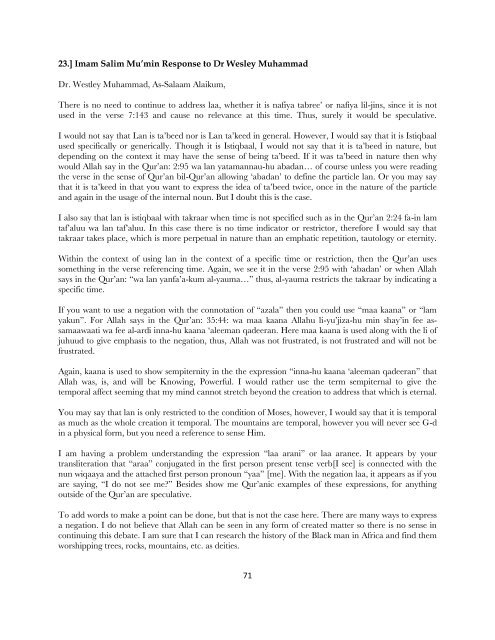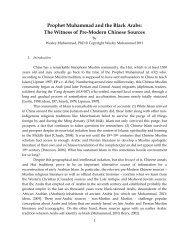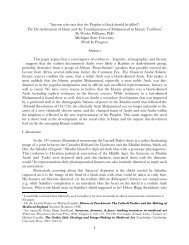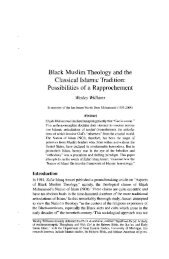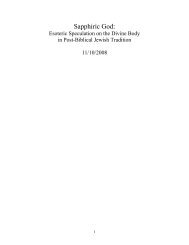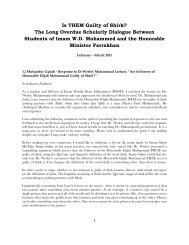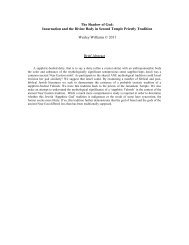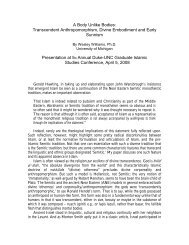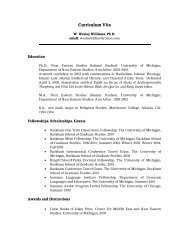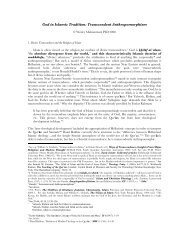Is THEM Guilty of Shirk? - Dr. Wesley Muhammad
Is THEM Guilty of Shirk? - Dr. Wesley Muhammad
Is THEM Guilty of Shirk? - Dr. Wesley Muhammad
You also want an ePaper? Increase the reach of your titles
YUMPU automatically turns print PDFs into web optimized ePapers that Google loves.
23.] Imam Salim Mu‟min Response to <strong>Dr</strong> <strong>Wesley</strong> <strong>Muhammad</strong><br />
<strong>Dr</strong>. Westley <strong>Muhammad</strong>, As-Salaam Alaikum,<br />
There is no need to continue to address laa, whether it is nafiya tabree‘ or nafiya lil-jins, since it is not<br />
used in the verse 7:143 and cause no relevance at this time. Thus, surely it would be speculative.<br />
I would not say that Lan is ta‘beed nor is Lan ta‘keed in general. However, I would say that it is <strong>Is</strong>tiqbaal<br />
used specifically or generically. Though it is <strong>Is</strong>tiqbaal, I would not say that it is ta‘beed in nature, but<br />
depending on the context it may have the sense <strong>of</strong> being ta‘beed. If it was ta‘beed in nature then why<br />
would Allah say in the Qur‘an: 2:95 wa lan yatamannau-hu abadan… <strong>of</strong> course unless you were reading<br />
the verse in the sense <strong>of</strong> Qur‘an bil-Qur‘an allowing ‗abadan‘ to define the particle lan. Or you may say<br />
that it is ta‘keed in that you want to express the idea <strong>of</strong> ta‘beed twice, once in the nature <strong>of</strong> the particle<br />
and again in the usage <strong>of</strong> the internal noun. But I doubt this is the case.<br />
I also say that lan is istiqbaal with takraar when time is not specified such as in the Qur‘an 2:24 fa-in lam<br />
taf‘aluu wa lan taf‘aluu. In this case there is no time indicator or restrictor, therefore I would say that<br />
takraar takes place, which is more perpetual in nature than an emphatic repetition, tautology or eternity.<br />
Within the context <strong>of</strong> using lan in the context <strong>of</strong> a specific time or restriction, then the Qur‘an uses<br />
something in the verse referencing time. Again, we see it in the verse 2:95 with ‗abadan‘ or when Allah<br />
says in the Qur‘an: ―wa lan yanfa‘a-kum al-yauma…‖ thus, al-yauma restricts the takraar by indicating a<br />
specific time.<br />
If you want to use a negation with the connotation <strong>of</strong> ―azala‖ then you could use ―maa kaana‖ or ―lam<br />
yakun‖. For Allah says in the Qur‘an: 35:44: wa maa kaana Allahu li-yu‘jiza-hu min shay‘in fee assamaawaati<br />
wa fee al-ardi inna-hu kaana ‗aleeman qadeeran. Here maa kaana is used along with the li <strong>of</strong><br />
juhuud to give emphasis to the negation, thus, Allah was not frustrated, is not frustrated and will not be<br />
frustrated.<br />
Again, kaana is used to show sempiternity in the the expression ―inna-hu kaana ‗aleeman qadeeran‖ that<br />
Allah was, is, and will be Knowing, Powerful. I would rather use the term sempiternal to give the<br />
temporal affect seeming that my mind cannot stretch beyond the creation to address that which is eternal.<br />
You may say that lan is only restricted to the condition <strong>of</strong> Moses, however, I would say that it is temporal<br />
as much as the whole creation it temporal. The mountains are temporal, however you will never see G-d<br />
in a physical form, but you need a reference to sense Him.<br />
I am having a problem understanding the expression ―laa arani‖ or laa aranee. It appears by your<br />
transliteration that ―araa‖ conjugated in the first person present tense verb[I see] is connected with the<br />
nun wiqaaya and the attached first person pronoun ―yaa‖ [me]. With the negation laa, it appears as if you<br />
are saying, ―I do not see me?‖ Besides show me Qur‘anic examples <strong>of</strong> these expressions, for anything<br />
outside <strong>of</strong> the Qur‘an are speculative.<br />
To add words to make a point can be done, but that is not the case here. There are many ways to express<br />
a negation. I do not believe that Allah can be seen in any form <strong>of</strong> created matter so there is no sense in<br />
continuing this debate. I am sure that I can research the history <strong>of</strong> the Black man in Africa and find them<br />
worshipping trees, rocks, mountains, etc. as deities.<br />
71


